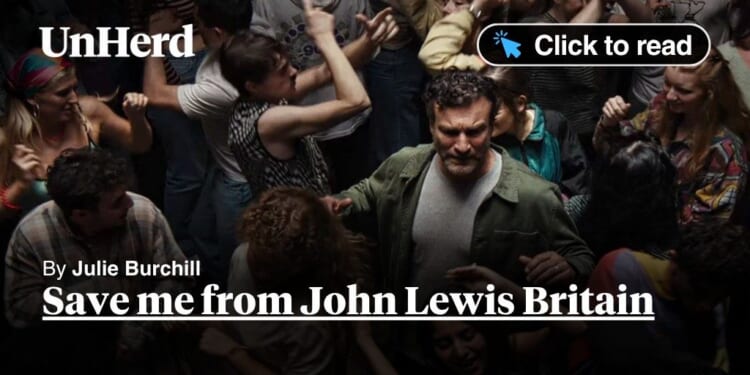Watching the new John Lewis Christmas advert, I felt a loathing so visceral that it was almost — almost! — sexual.
I could imagine the post-prandial ad-men, smug and sweaty around their Fitzrovia lunch table, brainstorming ideas for the 2025 edition of what has become one of our most shameful festive rituals. The advert must never be “traditional” and certainly not religious — that would be seen as “Right-wing”. No, it must say something meaningful about Britain today. It must supplant our tenderest feelings towards our loved ones at a time of fraying nerves, political turmoil and financial stress with emotional warmth towards a department store. It must pretend to care.
And so, here it is, a surly teenage lad buying his Centrist Dad a vinyl copy of that dance classic Where Love Lives — causing Centrist Dad to flashback to happier times and then re-connect with his lad at the end. Boys have feelings too! Men can cry! Males must hug or die! A pinch of Adolescence; a generous measure of Nineties dance nostalgia; et voila! That will get the old ravers at the school gates wetting themselves in sheer molten awe. Pass the coke.
You can’t say it isn’t effective. Within minutes of the advert’s release on Tuesday, the nation’s WhatsApp groups were awash with bawling adults barely able to contain themselves at the level of emotion this crass approximation of intergenerational love evoked in them.
It wasn’t always this bad. John Lewis’s inaugural Christmas ad in 2007 was directed by Michael “The Greatest Showman” Gracey and featured the Morning Serenade from Prokofiev’s Romeo and Juliet. There was a marked shift, however, by 2010 with “A Tribute to Givers” (2010), the schmaltz soundtracked by Ellie Goulding wimping the hell out of Elton John’s “Your Song”. The following year we were treated to “The Long Wait”, in which an apparently acquisitive kiddy (twist: he can’t wait to “gift” his parents) counts down the “sleeps” to Crimbo to the sound of a Smiths song sung by a pensive sloth. At this point, the hitherto rather old-fashioned John Lewis Partnership, founded in 1864, found itself becoming something like a phenomenon, as much a part of the build-up to Christmas as Mariah Carey and pavement pizzas outside every pub.
But it’s their lack of healthy vulgarity that makes these ads so loathsome. They’re “wistful”, one of my least favourite looks, generally flavoured by airheads who want to seem deep but are probably thinking about what kind of sprinkles to have on their latte. Naturally, as with most cynics, the admen behind the wistfulness have a sentimental streak a mile wide, hence the repeated trope of children turning up trumps when we thought they might be little swine. And as is often the case with sentimentality, the adverts hide a multitude of sins.
In “The Unexpected Guest” (2021), a black child meets a white female alien in a forest (seeming to suggest that the only good white person is one from another planet) and instructs her in the ways of Christmas. It’s enough to make a cat laugh, especially as this was also the year the company was fined for paying workers below the minimum wage. (I bet they didn’t pay the advertising agency below the minimum wage; I bet they paid them a fortune.)
John Lewis, of course, rather creepily insists on calling its workers Partners — which always sounded very like the soft-soap before the shafting. Only last year, the company announced a swingeing cut to its workforce — up to 11,000 jobs out of 76,000 workers — having announced its second full-year loss in 2023 (a whopping £234 million). Bonuses were cancelled and redundancy packages crushed from two weeks of pay per year to one. Just as creepily, it has told the BBC it “has a plan to return to profit… that sadly means reducing the number of Partners we need in our business.”
The commercials themselves are less advertising than branding — designed to make us associate the shop with the sort of warm, fuzzy feelings that we’d normally associate with Christmas itself. But there’s a cautionary tale to be told here. This isn’t the first time a TV commercial became an end in itself, rather than a means of boosting profits.
Back in the Seventies, a knockabout series of TV ads for Cinzano vermouth, featuring Leonard Rossiter finding various ways to tip his tipple over Joan Collins’s tits, became something of a national obsession. However, the principal beneficiary turned out not to be Cinzano but the already market-leading brand Martini. As one industry source told Marketing Week: “Everyone remembers that ad but it was so engrossing that people forgot it was for Cinzano and went out and bought Martini.” One can imagine the same thing happening with the John Lewis ads. Can’t believe Christmas is here again! Better go on Amazon and see what’s on offer.
The Lewis commercials, though, have long been high on their own supply — vanity projects supreme. Like Paddington, whom everyone in their right mind must surely want to throttle by now, they are the soundtrack to what Gareth Roberts calls “the Tyranny Of Twee”. They are up there with the Book of Nom and holibobs and constant cries of “Stay hydrated!”
But behind the bluster, most people in advertising really do feel that they have sold out — and with good reason. (“By the way if anyone here is in advertising or marketing — kill yourself. No. Seriously. Go home and kill yourself. You are Satan’s little helpers” — Bill Hicks). Thus they seek to make the songs which galvanised them in their youth as desiccated and decaffeinated as they themselves now are. The sound of The Human League and Morrissey, the Beatles and Oasis, are too full of the dreams and yearning of youth. They must be mulched down into easily digested canned-nourishment meal-replacements so as not to disturb the digestion of Johnny Marketeer.
This year, however, John Lewis has gone the other way — and given me yet another thing to hate about them — by using the original version of “Where Love Lives”, a song I love (though, true to form, they pollute it with a new dirge-version by Labrinth at the end). This banger brings back such happy memories of being newly moved to Brighton and falling in love with my husband. Now my memories have been mugged by Saatchi & Saatchi, as Centrist Dad grinds that happiness into cringe on the dance floor.
“Now my memories have been mugged by Saatchi & Saatchi.”
Too bad. We all live in John Lewis Britain now. We’ve all drunk the consumerist Kool-Aid and become a nation of sentimental saps who consider a commercial (the clue is in the name) to be a piece of high art. So effectively has commerce infiltrated our homes, our families, our hearts and minds, we can no longer tell the difference.
John Lewis: never knowingly underestimating the presumed gullibility of the British public. Except that we aren’t so gullible anymore. The break-down of conventional politics, and the utter lack of trust in the establishment, may well see the end of these loathsome, lazy indulgences which seek to pick our pockets even as they pat our heads. This Yule, let that be our Christmas wish, to misquote Yeats, that the Centrist Dads will not hold. Let the 2025 John Lewis advert be their swansong.

















